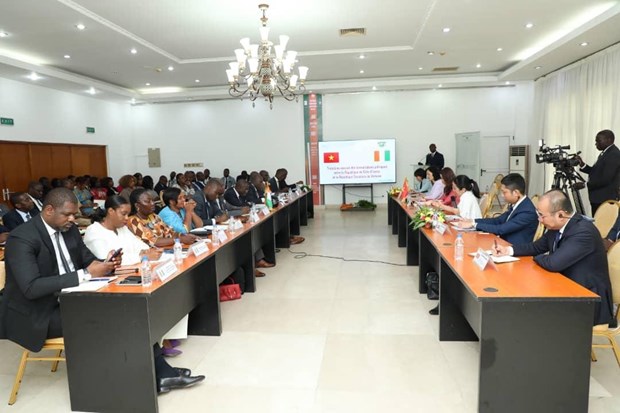
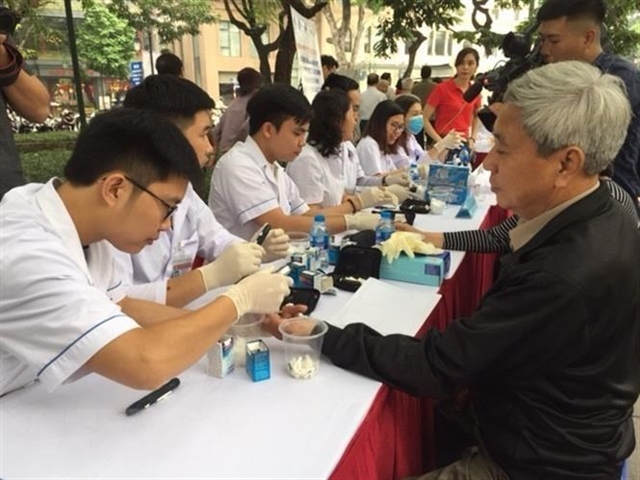
|
| Doctors conduct pre-diabetes tests for a patient. VNA/VNS Photo Dương Ngọc |
HÀ NỘI — Controlling the number of people with hypertension and diabetes is a big challenge for Việt Nam, experts said.
As living standards improve, the disease pattern in the country was changing, said Minister of Health Nguyễn Thị Kim Tiến at a workshop entitled ‘Associate education and treatment in optimising the management of hypertension and diabetes’ held in Hà Nội over the weekend.
Non-communicable diseases account for about 70 per cent of total diseases in Việt Nam and are the leading cause of death – accounting for 77 per cent of total deaths nationwide.
Statistics from the Ministry of Health (MoH) showed that many people were not aware that they suffered from hypertension or diabetes.
The number of patients undergoing treatment was low, with about 29 per cent of diabetes patients and 14 per cent suffering from hypertension undergoing some form of care. The main reason was a lack of knowledge among Vietnamese patients.
In order to prevent and limit non-communicable diseases including diabetes, the Vietnamese Government has issued the ‘Việt Nam Health Programme’ with 11 solutions, Tiến said. Of which, four solutions were being actively implemented, including proper nutrition, strengthening physical activity, and preventing harm caused by tobacco and alcohol.
In addition, the MoH was also piloting a programme for early detection of diseases such as diabetes, cardiovascular problems and cancer.
The health sector also focuses on primary health care activities and health promotion associated with grassroots healthcare in communes and districts.
Burden of diabetes
According to the International Diabetes Federation, there were 3.5 million people suffering from diabetes in Việt Nam in 2017, and this figure was predicted to rise to over 6 million by 2045.
Given the high rate of diabetics in Việt Nam, treatment cost for the disease was a key issue.
Phạm Lương Sơn, deputy director general of Việt Nam Social Insurance (VSI), said diabetes was one of the urgent global issues slowing sustainable development, especially in low-income and middle-income countries.
According to the World Health Organisation, there are now more than 190 million people with diabetes worldwide and this number is increasing.
Every year, the health insurance fund has paid trillions of Vietnamese đồng for diagnosis and treatment of diabetes. Given the difficulties in balancing the health insurance fund, it was necessary to manage the expenditure for diabetes examination and treatment properly as this was not only beneficial for patients but also society as a whole.
Speaking at the conference on the management of treatment for diabetes held on Friday, Nguyễn Thị Thanh Hà from VSI said tests and diagnosis of diabetes were always among the top 50 technical services with the largest expenditure in Việt Nam; accounting for about 8 per cent of the health insurance fund’s expenditure.
Last year, the total cost of diabetes treatment was over VNĐ5.3 trillion (US$226.7 million), up 13 per cent compared to 2017.
Participants at the workshop emphasised the need to effectively control expenditure as the cost of treating diabetes was expected to increase by 42 per cent from 2017 to 2045.
They said it was essential to strengthen the role of healthcare at the grass-roots level, sharing data from health insurers to limit unnecessary technical services. The application of new techniques and drugs was a must to increase efficiency and reduce costs.
Attention should be paid to information campaigns on non-communicable disease prevention, reducing salt consumption and controlling weight.
It was necessary to strengthen early detection and treatment of the disease; periodically conduct national surveys as part of a non-communicable disease surveillance system to monitor risk factors and implementation measures on prevention of the diseases in Việt Nam, they said. — VNS
In box (already edited)
MSA and Servier Việt Nam start project to prevent NCDs
HÀ NỘI — The health ministry’s Medical Services Administration (MSA) and French pharmaceutical firm Servier Việt Nam will collaborate to improve blood pressure monitoring and diabetes control in Việt Nam.
The agreement, signed on June 18 in Hà Nội, established a two-year project entitled “Ngày đầu tiên" (The first day).
MSA director Lương Ngọc Khuê said the agreement marked an important milestone in the prevention of non-communicable diseases (NCDs) in Việt Nam, especially diabetes.
The project aims to improve awareness among physicians, patients and families of NCD patients, helping patients detect diseases at an early stage and develop healthy lifestyles to control their diseases in the long term.
The project will also collect data from patients, helping to provide the health sector with more information about the Vietnamese people.
As part of the push to raise awareness, the project will work to improve ngaydautien.vn, a website on preventing non-communicable high blood pressure and diabetes. The project will also include a push to strengthen the early detection system and develop around 200 consultation centres at hospitals throughout the country.
MSA and Servier Việt Nam will also work with medical facilities to train medical staff on how to detect the diseases and help patients manage them. — VNS
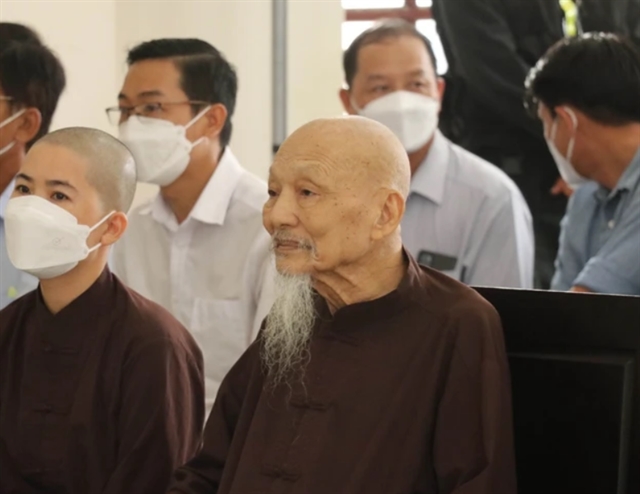
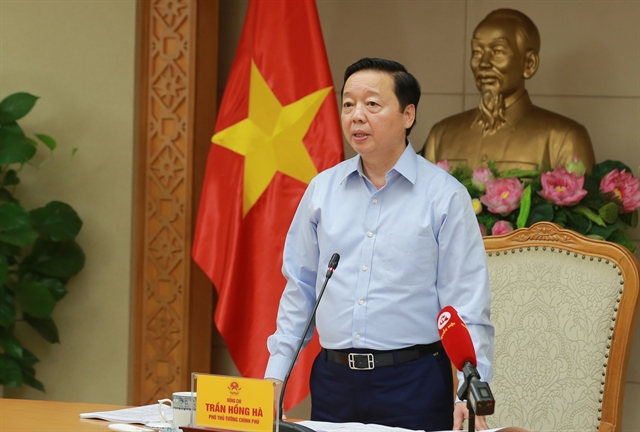
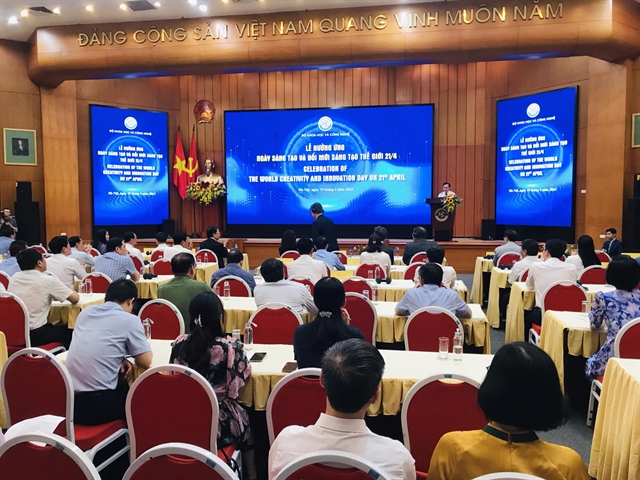

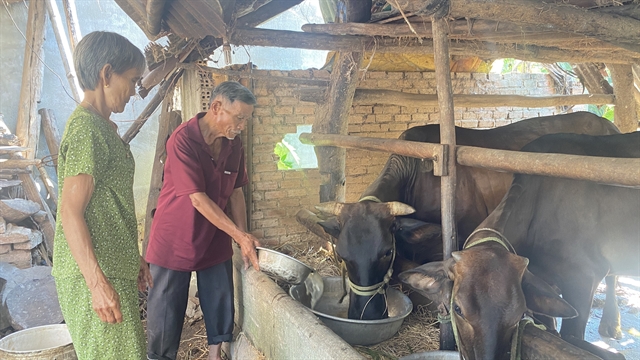
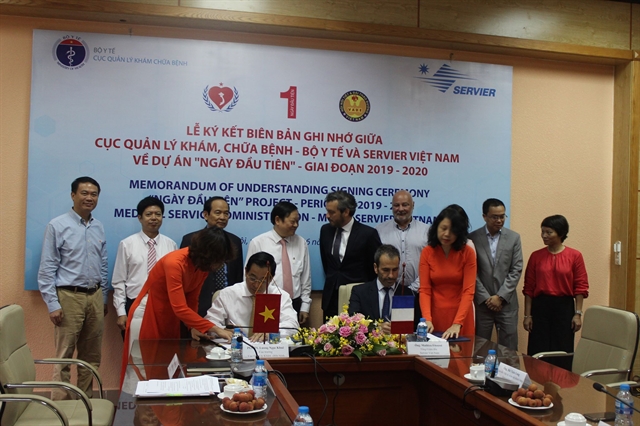
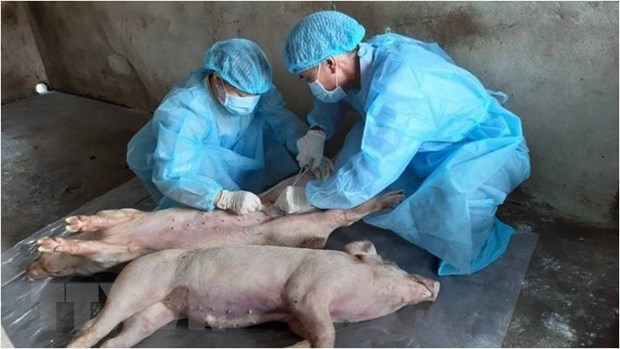







.jpg)

